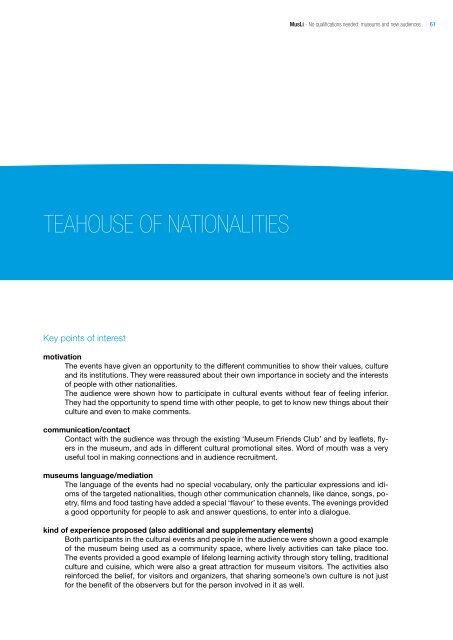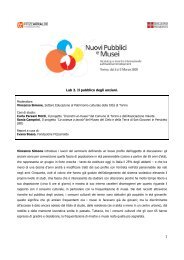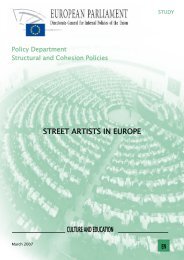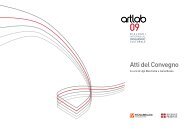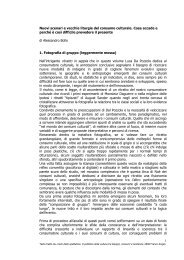MusLi (Museums Literacy) - Fondazione Fitzcarraldo
MusLi (Museums Literacy) - Fondazione Fitzcarraldo
MusLi (Museums Literacy) - Fondazione Fitzcarraldo
You also want an ePaper? Increase the reach of your titles
YUMPU automatically turns print PDFs into web optimized ePapers that Google loves.
TEAHOUSE OF NATIONALITIES<br />
Key points of interest<br />
<strong>MusLi</strong> - No qualifications needed: museums and new audiences<br />
motivation<br />
The events have given an opportunity to the different communities to show their values, culture<br />
and its institutions. They were reassured about their own importance in society and the interests<br />
of people with other nationalities.<br />
The audience were shown how to participate in cultural events without fear of feeling inferior.<br />
They had the opportunity to spend time with other people, to get to know new things about their<br />
culture and even to make comments.<br />
communication/contact<br />
Contact with the audience was through the existing ‘Museum Friends Club’ and by leaflets, flyers<br />
in the museum, and ads in different cultural promotional sites. Word of mouth was a very<br />
useful tool in making connections and in audience recruitment.<br />
museums language/mediation<br />
The language of the events had no special vocabulary, only the particular expressions and idioms<br />
of the targeted nationalities, though other communication channels, like dance, songs, poetry,<br />
films and food tasting have added a special ‘flavour’ to these events. The evenings provided<br />
a good opportunity for people to ask and answer questions, to enter into a dialogue.<br />
kind of experience proposed (also additional and supplementary elements)<br />
Both participants in the cultural events and people in the audience were shown a good example<br />
of the museum being used as a community space, where lively activities can take place too.<br />
The events provided a good example of lifelong learning activity through story telling, traditional<br />
culture and cuisine, which were also a great attraction for museum visitors. The activities also<br />
reinforced the belief, for visitors and organizers, that sharing someone’s own culture is not just<br />
for the benefit of the observers but for the person involved in it as well.<br />
61


